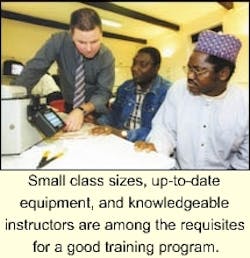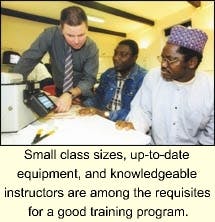What makes a good training course?
Most people are under the misconception that training is just about receiving a certain qualification or badge and that, once they have it, this recognition is their magic ticket to enlightenment and wealth. Unfortunately, such hype diverts attention away from the real concern-that is the training itself. There should be far more focus put on the quality of training and the skills and knowledge gained by those taking part. The main emphasis on all training within the fiber-optic and communications industry should be put on providing delegates with the right knowledge and skills to do the job professionally.
Another concern is that given the current skills shortage within the industry, companies are putting far too many people into situations that they are not trained to handle. This has already led to many difficulties-jobs taking far longer to complete and projects incurring a variety of technical inconsistencies. Significantly, all of this takes time and financial resource to put right.
The only way to counteract the worldwide skills shortage is for companies to attract the best people to their ranks and offer them comprehensive ongoing training programs.
One of the most important reasons why we all need ongoing development is to keep ourselves up-to-date. We work in an industry where technology moves extremely quickly, and therefore it is vital that we keep abreast of the very latest developments. This may be in terms of using new equipment or becoming familiar with new techniques. The big problem, though, is that many people just don't know what they don't know, which makes it even harder to convince people that they need training at all. Once that has been accepted, half the battle has been won.
While there are a wide range of training establishments around, including manufacturer-led training courses and in-house programs, the most comprehensive courses are usually those that are run by specialist-independent technical-training companies. As a rule these companies offer only training and so will not be affected by a hidden agenda such as pushing a specific make of equipment or exclusive brand of approval.
Since there is a great variety in quality when it comes to training, choosing the right training program is not always as straightforward as we think. Here are some of the qualities that should be required:
- Technical expertise. The technical expertise of the company is the single most important thing to consider. In order to run a training course within the industry, the training provider should be competent, professional, and experienced within the specific field. Some training organizations cover a very wide range of subjects and use freelance trainers to do this, which often means that there is no actual expertise in the organization itself. The level of expertise can vary tremendously, so the best thing to do is to find out as much information as possible about the training establishment and the background of its trainers.
- Training material. The written material is also vital to its success. Rather than expecting delegates to write lots of notes-often in a short time-the best courses are those that supply a comprehensive training handbook with sections for delegates to add their own personal notes as well. Ideally this should be clearly written. For companies with employees from all over the world, it is important that those whose first language is not English can still understand the supporting materials.
- Supporting equipment.We have already said that one of the main reasons why we all need to attend training courses is to keep up-to-date with the latest technology. The training company you choose should share this ethos too. This will mean that trainers are aware of the latest market trends and developments and the equipment they provide is equally up-to-date. Delegates need to be trained on equipment that they will then use in the workplace.
- Class size. It is essential that training companies keep class sizes manageable. Each delegate should have access to all the relevant equipment. If class sizes are approximately six people, then delegates will all receive the attention they deserve. It is well known that the bigger the class size the poorer the results. For companies, it is far better to send a number of smaller groups than to expect a trainer to teach a large group of delegates.
- After-course care. Many training providers assume that once a particular course is over then that is the end of their relationship with the delegate. However, the best training companies are those that offer an ongoing service that lasts well after course completion. Some companies offer a post-course technical support service and a comprehensive consultancy service.
With the growth in Internet and computer technology, there has been a growing trend toward "online" methods of training, either through the Internet or CD-ROM. Such training, however, does not include hands-on experience and does not fully reflect real-life situations.
High-quality training relies on the trainer to provide live demonstrations of techniques, which can then be repeated by the delegates themselves and followed up by questions and answers. It is also essential that delegates can interact with one another and learn from one another's experiences. On-line training methods cannot provide delegates with personal interactive experiences that are so vital when learning any craft.
What makes a good training course? That is not an easy question to answer and as we have seen, there are many aspects to consider. There is no doubt that personal training has never been more important to all professionals working within the fiber-optics and communications industry.
Richard Ednay is founder of Optical Technology Training (OTT-Skipton, North Yorkshire, UK). He can be reached via the company's Website, www.ott.co.uk.

